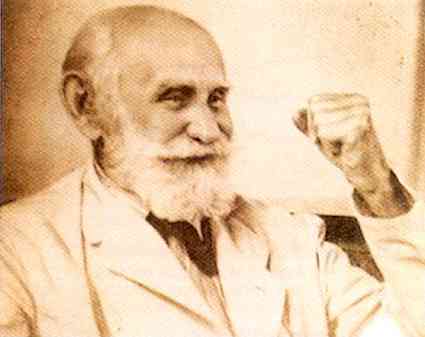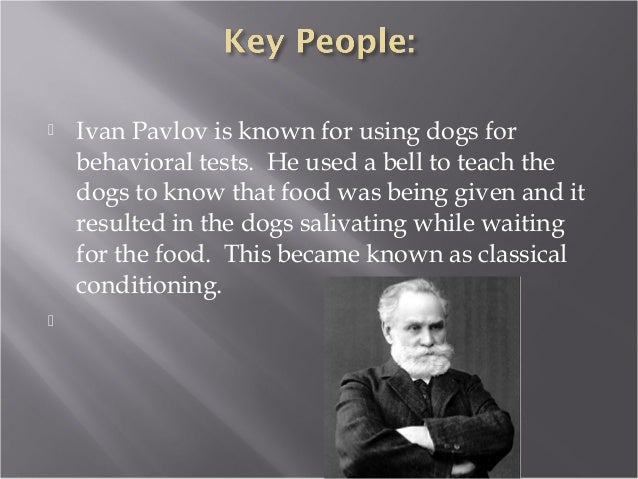
Specifically, he wrote about the function of the.
#IVAN PAVLOV PIONEERED THE STUDY OF SERIES#
From this hardly contestable point of view, the fundamental facts of the psychological part of the physiological optics is physiologically nothing else than a series of conditioned reflexes, i.e., a series of elementary facts concerning the complicated activity of the eye analyzer. Throughout the 1870s and early 1880s, Pavlov studied the natural sciences and physiology, conducting research and working on his doctorate thesis. When a certain combination of stimuli, arising from the retina and ocular muscles, coincides several times with the tactile stimulus of a body of certain size, this combination comes to play the role of a signal, and becomes the conditioned stimulation for the real size of the object. When, for example, the physiologist says that for the formation of the conception of the actual size of an object there is necessary a certain length of the image on the retina and a certain action of the internal and external muscle of the eye, he is stating the mechanism of the conditioned reflex. In part, “evidently what the genius Helmholtz referred to as ‘unconscious conclusion’ corresponds to the mechanisms of the conditioned reflex. Ivan Pavlov speaks on the conditioned reflex which German physiologist Hermann von Helmholz (1821-1894) had referred to in his writings as “unconscious conclusion” (). This research is approximately one hundred years old.” Compared with the structuralists, early behaviorists were much less likely to focus on the study of.

From this it is not difficult to understand that the study of the most complicated part of central nervous system of the higher animals is up to now still not regularly and continuously progressing. And the physiologist undertook the ungrateful task to guess the inner world of the animals. Pavlov says (page 5) that “psychology up to now still is the realization of the inner world of humans in search of their own, real methods. While not mentioning Darwin or his theory of evolution by name, Ivan Pavlov claims that only an experimental study of animal adaptation to the external environment can produce scientific knowledge on the elementary modes of behavior.

In 1910, this lecture was also published in “In Memory of Darwin”, a collection of essays honoring the 100th anniversary of Darwin’s birth and the 50th anniversary of the publication of his On the Origin of Species. The lecture is nineteen pages long, the remaining pages containing announcements of other books for sale by the publisher. Ivan Pavlov has written, in French, “Hommage de l’auteur”, at the top of the cover of the 48 page booklet published in Wiesbaden, 1910. Inscribed copy of Ivan Pavlov’s 1909 lecture at the 12th Congress of Russian natural Scientists and Physicians in Moscow entitled “Natural Science and the Brain” in which he discusses animal adaptation to its external environment and conditioned reflex. He also mentored a number of outstanding pupils who assisted to continue his scientific study legacy after he passed away.RUSSIAN PHYSIOLOGIST CONDUCTED FAMOUS EXPERIMENT DEMONSTRATING CONDITIONED REFLEX IN DOGS. Pavlov's scientific achievements eventually earned him the Nobel Prize in Physiology or Medicine in 1904. Sechenov, the founder of Russian physiology, also impacted his choice to enter the realm of scientific inquiry. As we learn, we alter the way we perceive our. The revolutionary ideals of literary critic D.I. The first of these, Ivan Pavlov, is known for his work on one important type of learning, classical conditioning. By doing so he noticed how the dogs began to salivate as soon as one of his assistants entered the room. After reading Charles Darwin's "The Origin of Species," he abandoned this concept and chose to devote his life to research. Pavlov discovered the concept of classical conditioning while studying the digestion in dogs.
#IVAN PAVLOV PIONEERED THE STUDY OF PROFESSIONAL#
His first professional choice, as the son of a rural priest, was to pursue a career in theology. system of dogs, known today for his work on conditioning a form of.

He had a natural aptitude for study as a young child. Ivan Pavlov, a Russian physiologist won a Nobel Prize for his work on the digestive. However, the boy's intrinsic curiosity was not stifled by his early struggles. He grew raised in poverty as part of a large family. His research mostly focused on the effect of stimuli on producing salivation in dogs before they were given food. Later he pioneered the study of the molecular basis of mammalian sensory mechanotransduction that underlies our sense of. Ivan Pavlov, a Russian psychologist has propounded the Theory of Classical Conditioning which emphasizes that learning as a habit formation is based on.

His study into the physiology of digestion led to the invention of the Classical Conditioning experimental learning paradigm. Ivan Pavlov was a Russian scientist who discovered conditioned reflexes in the cerebral cortex of the brain as a result of his work on the digestive system of dogs.


 0 kommentar(er)
0 kommentar(er)
